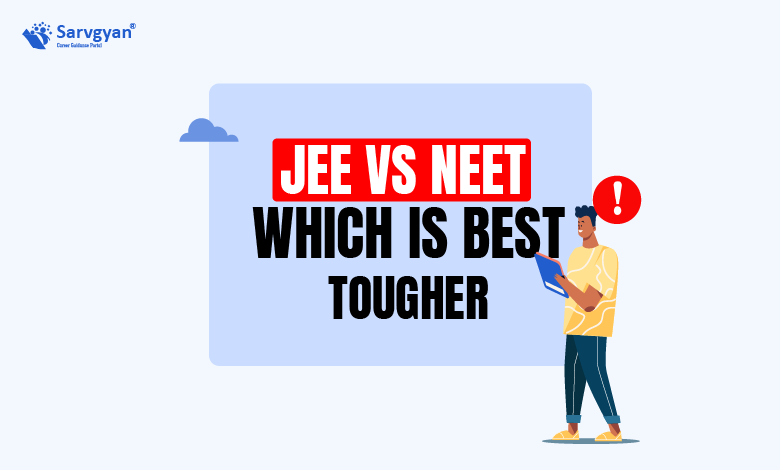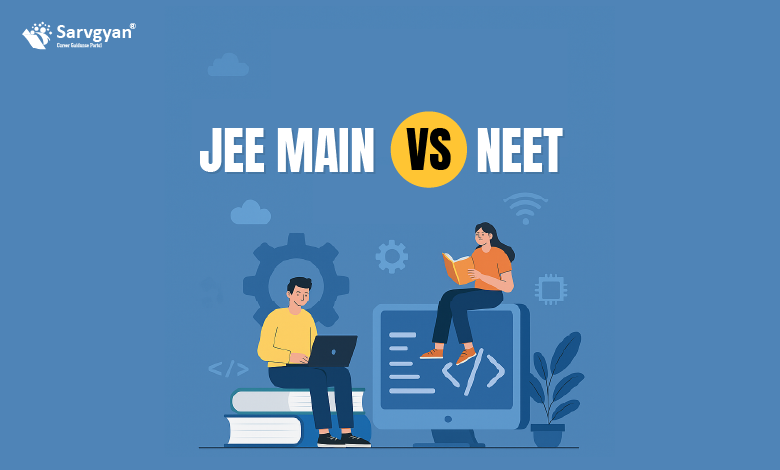The two most pursued career options in India after class 12 are engineering and medicine. Most students begin preparing for these competitive paths right after clearing their class 10 board exams.
For these careers, the entrance exams that are everyone’s first choice are JEE for engineering and NEET for medical. Both are highly competitive exams in their respective fields, which are taken by lakhs of students every year.
As there is so much competition, candidates always search and want to know which exam is tougher, JEE or NEET? Which one is better? What are the key differences between the two?

What's Your Doubts on JEE vs NEET? Ask Us
This article will answer all your doubts about JEE vs NEET in a clear and simple way. So, continue reading and feel free to ask anything at any point.
What Is JEE?
The term JEE refers to Joint Entrance Examination. It is a national-level entrance examination. Through JEE, candidates get admission into top Engineering colleges in India, such as IITs, NITs, IIITs, and GFTIs. In JEE, we have Main and Advanced:
- JEE Main is conducted twice a year in January and April. Candidates who will clear the Mains will get admission to NITs, IIITs, and are also eligible to take JEE Advanced.
- JEE Advanced is conducted in May, after 1 month of JEE Main. It is held once a year. Through the Advanced exam, candidates will get admission to the Indian Institutes of Technology (IITs).
JEE Main is considered easier than JEE Advanced because it focuses more on NCERT-based concepts and has simple and direct questions, whereas JEE Advanced tests deep understanding, application, and problem-solving skills at a higher level.
What is NEET?
NEET, National Eligibility cum Entrance Test, also known as NEET UG, is India’s only entrance for MBBS, BDS, BAMS, BHMS, and other AYUSH medical programs. It is conducted by the National Testing Agency (NTA) once a year in May.
Candidates who have Physics, Chemistry, and Biology in their 10+2 are eligible to take the examination. The NEET exam is conducted in pen and paper mode.

Differences Between NEET Vs JEE
Check out the differences between the JEE and NEET below in the given table:
| Category | JEE (Main & Advanced) | NEET (UG) |
| Full Form | Joint Entrance Examination | National Eligibility cum Entrance Test |
| Subject/Stream Required | PCM (Physics, Chemistry, Mathematics) | Physics, Chemistry, Biology (Botany & Zoology) |
| Conducted By | NTA (Main), Indian Institutes of Technology IITs (Advanced) | National Testing Agency (NTA) |
| Exam Mode | Main: Online (Computer-Based Test). Drawing test for B.Arch is offline Advanced: Online (Computer-Based Test). | Pen-and-Paper (Offline) |
| Exam Frequency | Main: Twice (Jan & Apr) Advanced: Once (~May) | Once a year (May) |
| Duration | Main: 3 hrs. Advanced: 6 hrs (Paper 1 & 2 – 3hrs each) | 3 hrs |
| Question Types | MCQs + Numerical (Main) Advanced logical/ comprehension & integer answers (Advanced) | Multiple Choice Questions (MCQs) only |
| Total Questions / Marks | Main – 75 questions & 300 marks (B.E/ B.Tech), 77 questions of 400 marks (B.Arch), 100 questions of 400 marks (B.Plan) Advanced – Paper 1/ 2 will have a total of 54/ 51 questions and 18/17 each in PCM subjects | 180 questions out of 200, a total of 720 marks |
| Marking Scheme | JEE Main – +4 / –1 for MCQs; 0 for unattempted; no negative for numeric questions JEE Adv – +3 (MCQs)/ +1/+2/+3 (MSQs)-1 (MCQs); -2 (MSQs) | +4 / –1 for MCQs; 0 for unanswered |
| Languages Offered | 13 languages: English, Hindi, Assamese, Bengali, Gujarati, Kannada, Malayalam, Marathi, Odia, Punjabi, Tamil, Telugu, Urdu | Same 13 languages |
| Basic Eligibility | JEE Main Eligibility: Passed 12th with PCM subjects JEE Advanced Eligibility: 12th passed with PCM subjects & among top 2.5lakh rank in JEE Main | 12th passed with PCBE subjects + aggregate 50% marks (40% for reserved) in PCB + at least 17 years old |
| Number of Attempts | JEE Main: Max 06 attempts over 3 consecutive years Advanced: Max 2 attempts in consecutive years | No attempt Limit |
| Number of Appeared Candidates (as per 2015 data) | Appeared – 22 lakh+ (Main), 1.80 lakh+ (Advanced) Registered – 23 lakh+ (Main), 1.87 lakh+ (Advanced) | Appeared – 22,09,318 Registered – 22,76,609 |
| Difficulty Level | Main: moderate-high; Advanced: very high (conceptual) | Moderate-high; biology-heavy syllabus |
| Career Paths | Engineering disciplines, architecture, data science, research & development | Doctor, surgeon, dentist, medical research, AYUSH & veterinary fields |
| Counselling Authority | JoSAA (for Main & Advanced), CSAB for leftover seats | MCC (AIQ) + state counselling bodies |
JEE vs NEET: Which Is Tougher
Among the most common questions we have are “Is JEE More Difficult Than NEET?” or “Is NEET More Difficult Than JEE?“. The truth is, both exams can feel tough, and both can seem easy at the same time. Sounds confusing, right?
That’s because JEE and NEET are challenging in their unique ways. Based on their syllabus, exam pattern, and format, the level of difficulty is high in both exams, but in different aspects.
JEE demands strong conceptual understanding and problem-solving in Physics, Chemistry, and Mathematics, while NEET requires accuracy, speed, and excellent memory in Biology, Chemistry, and Physics. It’s important to understand that any exam becomes manageable with the right preparation.
But that doesn’t mean the exam itself is easy. Over the years, both JEE and NEET have had particularly difficult papers, some even considered the toughest in their respective histories.
In the end, the difficulty level often depends on a student’s aptitude, interest, and preparation strategy. If you’re more analytical and enjoy solving problems, JEE may suit you better. If you’re passionate about life sciences and patient learning, NEET might be the right choice.
JEE vs NEET: Which Is Better?
We recommend that you, instead of asking “JEE or NEET, which is better?”, ask yourself, “Which is better for me?”
You cannot select an examination based on the exam toughness or difficulty level. Choosing between JEE and NEET should be done based on what aligns best with your career goals, interests, and strengths.
Select JEE If:
- You are good and have an interest in mathematics, physics, and logical problem-solving.
- Your interested area includes technology, engineering, AI, software, machines, or innovation.
- If you desire to pursue IITs, NITs, IIITs, or top engineering colleges.
- You can see yourself in roles like engineer, data scientist, researcher, or entrepreneur.
Select NEET If:
- You’re passionate about biology and human health.
- You aspire to become a doctor, surgeon, dentist, or medical researcher.
- You’re willing to commit to long-term study, including MBBS and beyond.
- You are ready and prepared, motivated by serving people, clinical work, or medical science.
Whether it’s engineering through JEE or medicine through NEET, choose the path where you can give your 100% and do well.
JEE or NEET- Which Exam Should You Choose?
One can choose between JEE and NEET as per their interest area and career goals. After completing your 10th class, from 11th, you have to decide whether you want to be a PCM student or a PCB student.
Your selection of the subject is the key, and take as much time as you want to be clear. If you like problem solving and have an interest in mathematics, then JEE is for you, but if you are more interested in life sciences or human anatomy, then NEET is your path.
Before selecting the subject or your career goal, make sure to have a discussion regarding the selection with your parents, mentor, and teacher. Both JEE and NEET are very prestigious in their own way, and one should select between them after being fully sure and aware of their interests, strengths, and long-term aspirations.
We are available for you below in the comment section. Feel free to ask your doubts regarding the comparison between JEE vs NEET.